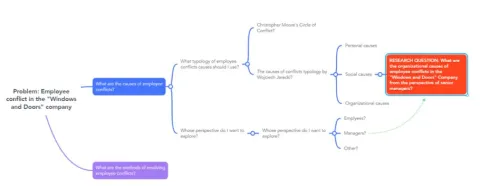EXERCISE 3
A strong research question is focused and specific. Of course, not everyone starts their work on a project with this level of certainty regarding what they want to focus on. You likely start with a general topic or research idea (e.g. learning motivation, professional burnout, political behavior) that you will develop into specific research questions over time. By asking questions that are too general, you can easily lose the course of action and, for example, get lost in the available data. Therefore, after developing a research question, you should consider whether it can be answered using the available literature, or whether new data should be collected. Remember that literature review is only feasible if the question has clear limitations.
Note how important time limitations are. Consider this example of the question: What social changes occurred in Poland in the 20th century? As you may know, the 20th century was a turbulent time in the history of Poland (and where was it not?), and there is little chance that your research would cover all these changes (which additionally may be embedded in their political, economic and other context). We propose reformulating the research question as follows: What social processes occurred in Poland in the years 1953-1956? Remember that time limits cannot be random, and you have to be able to explain your choice. In our case, it is two important events: the death of Joseph Stalin (1953) and the Polish October (1956).
A strong research question (or questions) determine the researcher's further activities. They set the direction for further research and create patterns of searching and collecting data. So, what do we mean by a strong research question?
A research question should focus primarily on an important social problem. When formulating a question, it is worth considering what the importance of the answer might be, whether on theoretical (scientific) or practical grounds. In other words, a researcher should think about how they can contribute with their research to a field of science.
How to construct a research question correctly? A case study
Suppose your area of research is the influence of computer games on humans. This might be a working research question: How do computer games affect us? However, the problem is too broad. There is little chance that your research would be successful. As mentioned earlier, this is one of the fundamental mistakes made by novice researchers: formulating broad, poorly defined questions. Think about the number of ways we can consider the issue of the impact of computer games on humans (besides the simple division into negative and positive impact): the social level (losing contact with peers as a result of spending time playing computer games), biological (the impact of computer games on the structure of human brain), psychological (computer addiction), or health (related to the emergence of health conditions due to excessive time spent in front of the computer, e.g. eyesight defects, posture defects). You will be unable to cover all these aspects in a single study of the impact of computer games on humans. What you should do is to detail your area of interest. Let's try, for example, to combine computer games with violence. However, do not ask whether violent computer games contribute to aggression among young people, as this topic has been extensively researched. How about introducing sports into the topic? We can ask now: Do people who do any physical activity at least once a week play violent computer games less often than people who are not physically active? You can be even more precise and include only students in your research. Therefore, together we have created a very interesting research question: do students who do some physical activity at least once a week play violent computer games less often than students who are not physically active?
OUR TIP: It's always worth organizing your thoughts!
When you developed some questions that act as research questions in your project, write them down. You can use one of the many free mind mapping tools available online. Mind maps can be especially useful at the initial stage of a project, when you are just looking for a direction in which you will develop your topic. Check out the following tools:
Below is an example of the MindMeister tool and an extract of the mind map we have developed for the problem of employee conflict in the “Windows and Doors” company.

Exercise 2
Read students’ ideas for their research projects presented below. You are acting as a scientific supervisor. Please decide whether the proposed research can contribute to the preparation of an original scientific work.
